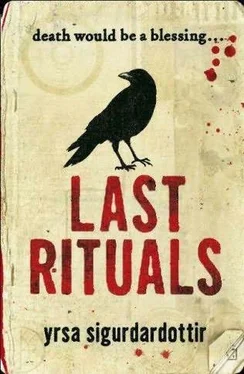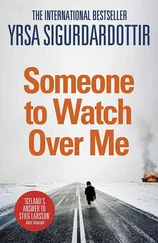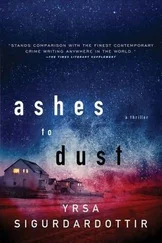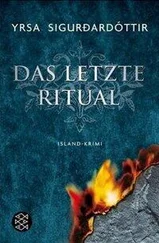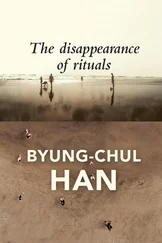Matthew wrinkled his brow. "His sons? Wasn't he a Catholic bishop? How could he have sons?"
The young man smiled. "Iceland had won some kind of dispensationI don't know exactly howwhereby priests, deacons, and bishops could have mistresses. They were even allowed to make formal contracts that were tantamount to marriage vows. If they had children they paid a fine and everyone was happy."
"How convenient!" exclaimed Matthew, taken aback.
"Yes, very," came the jovial reply. "Your friend Harald seemed to know the story well; he'd clearly read up on it. Of course I've only summarized it for you, there's much more to it. But anyway, that's the background to the question you were asking." He looked at Thora, who tried to conceal the fact that she had forgotten her question long ago. "Your friend was mainly interested in one thing when he talked to me: the printing press that Jon Arason had sent to Iceland in 1534 and set up in Holar, and what he printed on it."
"And?" prompted Thora. "What could you tell him?"
"It was a big question," the young man replied. "Very little is known about the first print. Some sources say it was a missala sort of manual for priests with a calendar of services, psalms, and the like. The four gospels of the New Testament were also printed at some stage. As far as I can establish nothing else is known about printing in Jon Arason's day. I remember your friend asking some rather curious questionsfor instance, if the bishop could have published a certain book that was very popular at that time. I asked if he meant the Bible but he just laughed. I didn't quite see the joke."
"No, I can imagine," said Matthew with a glance at Thora. "Malleus?" She had thought precisely the same. Malleus Maleficarum was the most printed book after the Bible in those days. Maybe Harald was trying to unearth whether it had been printed in Iceland. A copy would have been priceless, not to mention its symbolic value to a passionate collector such as him.
"And what did he want to know about Brynjolfur Sveinsson?" Thora asked.
"That was quite interesting," the young man said. "At first he was only interested in seeing his gravewhich is impossible because it hasn't been found yet."
Thora interrupted him. "Not found yet? Wasn't he buried here?"
"Yes, he was, but he asked to be buried outside the church, beside his wife and children. There's an account of the location, but it still hasn't been excavated. He wanted to rest in an unmarked grave."
"Wasn't that unusual?" Thora asked.
"Very much so. In fact, the grave was marked later with a wooden fence that stood for thirty years. Then it began to fall down and wasn't maintained, in defiance of the church's orders. No one really knows why he didn't give himself a tomb beneath the nave, as was the custom at that time. It's thought that he found it too cramped when he attended the funeral of one of his clergymen here. Maybe he wanted to put an end to the practice."
"And did it end?" asked Matthew.
"No, not at all. But there may have been another reason. He died a broken man. Understandablydying alone, that remarkable figure, with all his family dead and no descendants. Most people find his fate very moving."
"But you said Harald was interested in seeing Brynjolfur's grave at firstdid he move on to something else?" asked Thora.
"Yes, he did. I started talking to him about Brynjolfur when I saw how upset he was about the grave. I took him into the crypt and the archaeological exhibition there. Then I showed him the excavations outside. We got onto the subject of Brynjolfur's libraryyou know that he owned a large collection of Icelandic and foreign manuscripts?" Thora and Matthew shook their headsneither had any idea. "And you know that he gave some of Iceland's most remarkable calfskin books to King Frederik of Denmark?" Thora shook her head again.
"Your friend got very excited when I started telling him about the manuscripts and wanted to know what had happened to them when Brynjolfur died. I couldn't tell him exactly, but I did know that he gave his foreign books to the infant son of the governor of Iceland at the time, who was a Dane named Johann Klein, and that he shared out the Icelandic ones between his cousin Helga and his sister-in-law Sigridur. As far as I recall, some of the Icelandic books went astray; at least, some were missing when Johann Klein came to collect them. The clergy at Skalholt are suspected of hiding them to stop them from being sent to Denmark. Those books and manuscripts have never been found. No one even knows the titles."
"Where could they have hidden them?" Thora asked, looking all around.
The young man smiled. "Not in here. This building dates from 1956. The old church that Brynjolfur had built in 165051 collapsed in an earthquake in 1784."
"And you haven't looked for them?"
"We still haven't found the graves of Brynjolfur and his family, in spite of the description of the location. He died in 1675. We certainly wouldn't look for books that were only rumored to have been buried here at that time. And the fate of the books he bequeathed is uncertain. Apparently Arni Magnusson came across a few when he began collecting manuscripts. Some of Brynjolfur's books can be recognized from his monogram."
"BS?" Thora asked, for the sake of contributing something.
"No. LL." The young man smiled.
Thora repeated in surprise: "LL?"
" Loricatus lupus Latin for 'armored wolf,' which is what the name Brynjolfur means." He smiled at Thora who could not restrain herself from clicking her fingers. "Loricatus lupus" was written on Harald's scrawled map. They were clearly on the right track if his jottings had some connection with the murder.
Their conversation soon came to an end. Matthew and Thora thanked the young man for his patience. Before starting the car, Matthew turned to Thora and said: " Loricatus lupus, yes. Should we wait until everyone's gone home and dig up everything we can get a shovel through?"
"Definitely," Thora said with a smile. "Let's start with the cemetery."
"You'll have to do the shoveling, thenyou're dressed for the part. I'll sit in the car and light you up with the headlights."
They left Skalholt. "I know where we could go next," Thora said, with an air of innocence. "There are caves near Hella that were probably dug out by Irish monks. Maybe we can find an explanation there for Harald's interest in the hermits. I have a hunch Harald borrowed the flashlight to take a look around there."
Matthew shrugged. "It's worth looking intowon't we need a flashlight too?"
"Maybe we can pick one up at a gas station."
By the time they reached Hella it was pitch-dark. They began by buying two flashlights at a gas station. The attendant told them they could find information about the caves at Hotel Mosfell. It was only a stone's throw away, so they left the Jeep and walked. At the hotel a friendly elderly man followed them outside to point out the caves, which were just visible beyond the main road on the other side of the river. He also showed them the best path to take, since the caves could not be approached by car. After thanking him, they returned to the Jeep and drove straight over the bridge to where he had advised them to park. Much to Thora's delight they had to walk a fair distance over a meadow that appeared to belong to the farm there. Matthew kept stumbling in his slippery shoes but always managed to keep his balance by flapping his arms like he was trying to fly. When they reached the edge of the slope down to the caves, Thora was in excellent spirits.
"There," she said, pointing with her flashlight. She feigned concern. "Do you think you'll make it down there, Fred Astaire?"
Frowning back, Matthew tried to suck it up. He inched his way down the slope like a ninety-year-old man while Thora bounded down like a spring lamb. She struck a pose in front of him, determined to enjoy the moment, and called out mischievously: "Chop-chop!" Matthew ignored her and finally made it all the way.
Читать дальше
